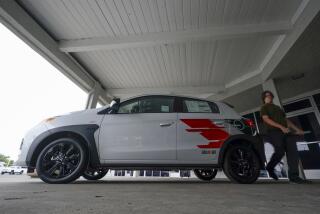Even With Repairs, Used Cars the Best Deal
- Share via
Determining whether to buy new or used typically has been a financial decision sed on a car buyer’s hunches and educated guesses.
In almost every case, a used car is going to be less expensive: Even if repair costs are high, the purchase price is usually much lower. The shopper needs to determine just how much the used car can save, and whether obtaining that savings is worth passing up a new car.
The purchase decision will be influenced by such factors as that great new-car smell, the desire to have the latest look and most advanced safety features or the need for a larger vehicle to hold a growing family.
Clearly, nonmonetary considerations will always be part of the equation.
But when consumers look at things from a purely financial perspective and consider cost categories that include depreciation, financing, fuel, insurance, maintenance, repairs and state fees, some interesting trends show up that could help influence their buying decisions.
While decision-making was based on guesswork in the past, nowadays the Information Superhighway is jammed with data that can provide definitive answers to your financial questions.
For the 1995-97 model years, data collected by IntelliChoice show that used passenger cars, on average, cost 9.5% less to own and operate than comparable new cars. For pickup trucks, the cost difference when buying used averages 6.2%, whereas used sport-utility vehicles cost a whopping 11% less than new ones to own and operate.
Thus, new is not always best, at least from a cost-of-ownership perspective.
Consumers certainly can save money by buying 1- to 3-year-old cars and trucks if they are willing to put up with the hassles of buying used. And many are willing: About 70% of the estimated 51.8 million cars and light trucks sold in the United States last year were “pre-owned.” The chance that they were buying someone else’s problems didn’t deter the nearly 37 million Americans who opted to travel the used-car path last year.
The one distinct positive for new cars and trucks is that they usually have lower repair and maintenance costs than used vehicles, “maintenance” being defined as all of the services recommended by the manufacturer to ensure trouble-free operation, including tuneups and replacement of brake pads, tires, fluids and filters.
But used vehicles typically have lower depreciation costs (much of the depreciation takes place in the first few years) and lower financing and insurance costs (even if the interest rate is higher on a used-car loan, the amount being financed is usually lower, which cuts the cost of financing).
Sometimes knowing the differences can help in deciding whether to keep an existing vehicle or buy a new one.
Assume you own a 1993 Chevrolet Lumina that is in good operating condition and paid for. Now you are thinking about buying a 1998 model.
Beyond the average purchase price of $19,609 for the 1998 Lumina, a tally of the expected costs of owning and operating the two cars during the next five years shows that keeping the old one can save you nearly $7,700.
Here are the projected five-year ownership costs for the driver weighing a new Lumina versus the old, paid-off one:
*--*
1998 Lumina 1993 Lumina Depreciation $10,485 $3,433 Financing 3,897 0 Fuel 3,695 3,610 Insurance 6,697 6,014 Maintenance 3,645 7,348 Repairs 740 1,605 State Fees 787 250 Cumulative $29,946 $22,260
*--*
And if the choice were between buying a new Lumina or a 1993 model, you’d add $1,381 to the five-year cost of the ’93 model to account for financing, but you’d still save almost $6,300 in ownership and operating costs, as well as the $13,000 difference in the purchase price.
IntelliChoice analysts, after examining the operating costs of all cars and trucks sold from 1995 through 1997, found that the used passenger car with the best overall value is the Honda Civic. The Chevrolet Suburban is the best value in used trucks and sport-utility vehicles marketed during those years. The best-value rating does not take into account the price a buyer pays for the used vehicle but looks only at the estimated costs of owning and operating the vehicle over a five-year period.
*
* IntelliChoice ownership cost comparisons and other services can be accessed on the Internet at https://www.intellichoice.com.
Peter Levy is founder and chief executive of IntelliChoice, which has been measuring the costs of owning and operating cars and trucks and issuing best overall value citations since 1987.






